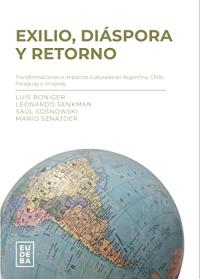Research
LACS affiliate faculty and graduate students generate timely and important research with a geographic focus on Latin America and the Caribbean.
RE•CAST: SCULPTURAL WORKS FROM THE ART MUSEUM OF THE AMERICAS
LACS graduate and faculty affiliates curate art exhibit on campus
Author/Lead: Abigail McEwenNon-ARHU Contributor(s):
Marco Polo Juárez Cruz & Gabrielle Tillenburg
Re•Cast is organized by UMD Department of Art History and Archaeology Graduate Students Marco Polo Juárez Cruz, Cléa Massiani, and Gabrielle Tillenburg, under the direction of Associate Professor Abigail McEwen.
LACS GA Víctor Hernández-Sang presents paper at LASA
Hernández-Sang presented his paper entitled "Haitian Dominican Gagá in the Media and the Press" at the 2022 LASA Conference
Author/Lead: Victor Hernandez SangThe paper analyzes the characterization of gagá and the Haitian Dominican community in the press and media, identifying two major talking points: 1) whether gagá is a Dominican tradition and 2) whether Vodou is a legitimate religion. Based on the examination of a variety of sources that include printed press since the 1970s, digital press and news media accessible online, and interviews with cultural brokers, Hernández-Sang traces the portrayal of the Haitian Dominican community by outsiders who use gagá and Vodou as objects to perpetuate ultranationalists and racist discourses. These voices that ascribe to anti-Haitian discourses take advantage of gagá and Vodou to scapegoat the Haitian Dominican community for the nation’s crises.
Exilio, diáspora y retorno
Transformaciones e impactos culturales en Argentina, Chile, Paraguay y Uruguay
Contributor(s): Saúl SosnowskiNon-ARHU Contributor(s):
Luis Roniger (Author), Leonardo Senkman (Author), Mario Sznajder (Author)
Publisher: Eudeba
During the late twentieth and early twenty-first centuries, dictatorships in Latin America hastened the outward movement of intellectuals, academics, artists, and political and social activists to other countries. Following the coups that toppled democratically elected governments or curtailed parliamentary oversight, the incoming military or civilian-military administrations assumed that, by forcing those aligned with opposition movements out of the country, they would assure their control of politics and domestic public spheres. Yet, by enlarging a diaspora of co-nationals, the authoritarian rulers merely extrapolated internal dissent and conflicts, emboldening opposition forces beyond their national borders. Displaced individuals soon had a presence in many host countries, gaining the support of solidarity circles and advocacy networks that condemned authoritarianism and worked with exiles and internal resistance towards the restoration of electoral democracy. Exiles soon became vehicles for spreading cultural ideas from abroad, celebrating cosmopolitanism over nationalism, and emphasizing human rights and democracy in Latin American countries.
Exile, Diaspora, and Return explores how Argentina, Chile, Paraguay, and Uruguay have been affected by post-exilic relocations, transnational migrant displacements, and diasporas. Specifically, this book provides the first comprehensive analysis of diasporic experiences and the impact of returnees on the public life, culture, institutions, and development of post-authoritarian politics in the Southern Cone of the Americas. Bringing together sociopolitical, cultural, and policy analysis with the testimonies of dozens of intellectuals, academics, political activists, and policy makers, the authors address the impact of exile on people's lives and on their fractured experiences; the debates and prospects of return; the challenges of dis-exile and post-exilic trends; and the ways in which those who experienced exile impacted democratized institutions, public culture, and discourse. Furthermore, the authors present new readings of the recent history of South America and the diasporas that emphasize the importance of regional, transnational or global dimensions over the national.
---
Este libro estudia, desde el análisis de las trayectorias personales y la inserción institucional, cómo Argentina, Chile, Paraguay y Uruguay se vieron afectados por las experiencias del exilio y el posexilio. Se intenta revelar cómo la variada experiencia transnacional de aquellos intelectuales, académicos, artistas, profesionales y activistas políticos y sociales contribuyó, durante y luego del destierro, a democratizar el campo cultural y a renovar algunas de las ideas e instituciones de estas sociedades. El exilio y el destierro son algunos de los legados del autoritarismo en estos países; se trató de un proceso que incluyó proscripción, desplazamientos forzados, expatriaciones y diásporas emergentes. Por medio del análisis de estas sociedades se pretende reconocer, describir y descifrar sus diferentes caminos en el período posdictatorial.
Muchos de los desplazados tenían un capital social y cultural previo que experimentó diversos cambios personales y organizativos a medida que se adaptaban a los diversos ámbitos culturales, lingüísticos, sociales y políticos de los países anfitriones. El retorno no es el resultado “natural” del fin de las dictaduras, sino que fue una –solo una– de las opciones para parte de los desplazados, y constituye un fenómeno complejo y multifacético. Las sociedades en general no siempre acogían de buen grado a los retornados y a sus familias. Surgían discusiones acerca del sufrimiento relativo de los que se quedaron frente al padecer de los que se fueron. Dada la falta de alternativas, el regreso fue parcial y prolongado. Las cuatro sociedades han experimentado un cambio radical al reconocer la importancia de los connacionales en la diáspora. La obra ha sido galardonada con el Premio Arthur Whitaker del 2022, otorgado por el Mid-Atlantic Council of Latin American Studies del 2022 al mejor libro de temática latinoamericana.
LACS affiliate faculty wins the BSOS Excellence in Research Award
Major BSOS award for a LACS affiliate faculty
Professor Ernesto Calvo of GVPT and LACS affiliate faculty received the BSOS Excellence in Research Award. Professor Calvo, the director of the Interdisciplinary Laboratory of Computational Social Science (iLCSS), won the prestigous award for his research on big data in Latin America.


